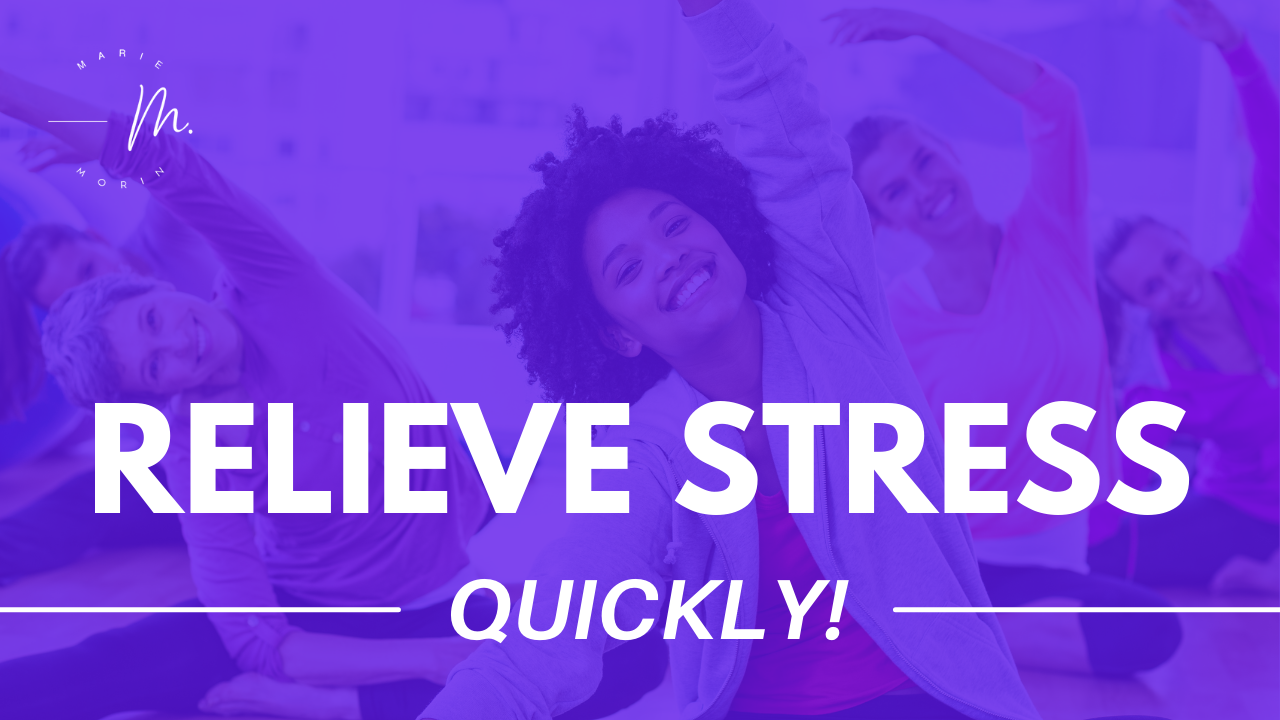The top 5 ways exercise reduces stress involve the brain’s immediate and long-term response to neurotransmitters and BDNF. Exercise increases the natural antidepressant, BDNF, that improves motivation and confidence.
Positive perceptions are gained from engaging in a practice that continues to give reward beyond just the workout. Simply put when one feels good, perceptions get an upgrade as well, and there is a drug-free prescription for stress.
If there were only two things that one committed to practice regularly, that significantly and positively alters the stress response, exercise and gratitude would win hands down. In this article, we explore the top 5 ways exercise reduces stress.
Top 5 Ways Exercise Reduces Stress
Exercise, undoubtedly, is a powerful and effective means to manage stress.
Whether it is running, walking, weightlifting, yoga, playing ball, or Pilates, exercise, tips the scale for immediate and long-term rewards. Considering the physiological effects of working out, research indicates improved bone health and the lowered risk of cardiovascular disease, type 2 diabetes, bladder, kidney, lung, and colon cancer to name a few.
1. Exercise Increases BDNF
The immediate rewards to high-intensity workouts, such as running, are often referred to as the runner’s high. Physical activity also releases the protein BDNF or brain-derived neurotrophic factor, a protein that is a powerhouse for brain cell health. BDNF also dubbed,” Miracle Grow for the Brain” in Harvard psychiatrist John Ratey’s book SPARK The Revolutionary New Science of the Brain. BDNF creates an amazing linking of better synaptic connections, increased cell health, and the creation of more BDNF that serves to improve mood, learning, memory and reduces anxiety. Research suggests a correlation of lower levels of BDNF with higher incidences of depression and anxiety. Aerobic activity and high-intensity interval training increase BDNF.
2. When your body feels good, you feel less stressed.
We know that the physiological benefits of exercise include improvements in muscle strength and endurance, increased oxygen in the brain and tissues, and improved cardiovascular system which in turn improves energy. These are excellent benefits to either start or continue to move a priority. An increasing body of research points to how exercise serves as the body’s most powerful means to live more vibrantly and healthy. For example, regular physical activity provides a barrier to developing chronic illnesses such as diabetes, obesity, depression, and cardiovascular disease.
Naturally, feeling unwell, having pain, and being diagnosed with a chronic illness brings enormous stressors and pushes the stress response upwards. In those instances, using relaxation techniques such as meditation and breathing can help. Also, if moderate exercise is permitted, endorphins released during exercise are known to reduce pain. Walking, yoga and Pilates are lower impact options that also positively impact the ability to cope with stress.
3. Exercise increases Stress-Reducing Neurotransmitters
The mental health benefits of exercising owe homage to the increased neurotransmitters dopamine, endorphins, and serotonin. Dopamine is the brain’s motivation champion with mice studies confirming this correlation. Likewise, exercise also boosts endorphins which promote feelings of well-being as well as improved mood. Naturally, having a better mood bumps your ability to manage stressful events. For better sleep cycles, we can thank the role of serotonin, not only does this neurotransmitter contribute to feeling good, it also helps in reducing your appetite. Now for those who are weight and size conscious, endorphin production revs up the motivation to exercise.
Exercise as the “Magic Pill”
Exercise has a greater effect on your brain than your body, according to John Ratey in SPARK. Ratey refers to exercise as the “magic pill” magic pill because it is a drug-free option to increase serotonin, dopamine, and norepinephrine. For example, exercise boosts your mental state more effectively than SSRI’s such as Zoloft. Selective serotonin reuptake inhibitors (SSRI), are commonly prescribed antidepressants. Low serotonin is often responsible for higher levels of anxiety, agitation, sleep issues, digestive issues, poor appetite, and depression. Exercise directly impacts the levels of the happiness mediator or serotonin.
4. Exercise Boosts Stress Threshold Coping
Consistent movement practices deliver an inoculation of sorts to the effects resulting from challenging events. It’s the body’s companion to translate the fight or flight response to rest and digest, or a managed state of calm.
Dopamine Regulates Motivation
Challenging the body to perform and expand its capacity to push to greater feats releases dopamine which in turn motivates further goal achievement. This feedback loop creates a perfect scenario to reap the rewards to encourage continued challenges. Also, the psychological benefits of even moderate amounts of exercise include improvement in body image, confidence, self-esteem, and mood. Just 10 minutes of low-intensity movement boost the threshold for coping with stress.
5. Exercise Improves Confidence
A few weeks or months into a regular exercise regime will naturally enhance feelings of accomplishment. Sticking to something and being cognizant of the consistent effort that the commitment to self-care provides fuel to further motivation. Besides, if a healthy eating regime couple’s exercising efforts, there will likely be positive visible changes in one’s physical appearance.
Exercise as a Psychological Reward
Also, exercise as a distraction to challenging life circumstances, coupled with psychologist Albert Bandura’s concept of self-efficacy further escalates the potential towards a stress management activity. For example, when an individual believes they can accomplish a task or activity, it provides the self-confidence to perform that activity and fosters a sense of control over one’s life. Bandura’s self-efficacy may be at the heart of consistent exercise and its layered gains.
More important than any theory or evidence, perhaps are the intrinsic reward of knowing one has a routine that brings physiological and psychological rewards to repeat.
Improved confidence reduces stress because it creates a buffer against stressful limited beliefs and negative thinking.
Multiply your Exercise Efforts with Intentional Meditation in Motion
Committing to an intentional daily practice of meditation has been shown to reduce stress, improve responses, lower blood pressure, improves immune system function, and enhances sleep. Imagine what combining exercise with the intention of mindfulness meditation simultaneously can accomplish.
A simple approach to meditation in motion would be to use the synchronized motion with the breath as in yoga also in activities such as weightlifting, walking, and Pilates. For each step on the treadmill or elliptical, align with your breath and focus on the moment. This practice can multiply the impact of movement practice. No doubt that exercising without intentional mindfulness meditation is amazingly distracting from the daily stressful onslaught of demands. Experiencing this additional twist is an option worth investigating.
- Meditation in Motion Tips
- Focus on individual muscles while lifting weights
- Focus on hearing the inhale and exhale
- Concentrate on each step while walking
- Be kind when you become distracted
- Remember it’s about enjoying the experience not doing it perfectly
- Resist the temptation to judge your performance.
Beginning Your Exercise Journey
Think of Exercise as Something You Get to Do
For beginners, it is important to start slowly to prevent injuries. Stretching on warm muscles is recommended. Remember your perception can make or break your commitment to continuing. Walking is a good place to start, being sure to have proper walking shoes. Decide on a comfortable walking path and set reasonable and attainable time and distance goals. Take it slow at first, so you set up your sense of accomplishment necessary for habit formation. Walking in the morning, preferably within 2 hours after sunrise can hit two excellent objectives of bumping up a self-care practice. Even just gazing out a window for a few minutes has the effect of priming the circadian rhythm cycle. In essence, waking and walking early in the morning all while taking time to view the early yellow-tinged sunlight will result in better sleep cycles.
While exercise is known to aid in good sleeping, it is also helpful to work out some immediate angst. If you find yourself having a rough go at self-regulation, head on over to the gym and work it out. It is an excellent distraction as well as diffuses stressful events and serves to soothe the nervous system.
For those who have made the lifestyle change to commit to regular physical activity, most will admit to enjoying the regimen. It is not uncommon to be so attached to a working out and the enormous benefits from the release of endorphins and dopamine. For this reason and the health benefits as well, including exercise at least 5 days a week is an excellent way to combat stress. Daily walks first thing in the morning, without your phone, can become something you won’t easily give up. Think of it as something you get to do more for your state of mind than anything else. These are the habits that have multiple positive effects on stress reduction and maintain a resilient lifestyle.
The top 5 ways exercise reduces stress involve the brain’s immediate and long-term response to neurotransmitters and BDNF. Exercise increases the natural anti-depressant BDNF, improves motivation and confidence. Positive perceptions are gained from engaging in a practice that continues to give reward beyond just the workout. Simply put when one feels good, perceptions get an upgrade as well, and there is a drug-free prescription for stress.
“If there were only two things that one committed to practice regularly, that significantly and positively alters the stress response, exercise and gratitude would win hands down. In this article, we explored the top 5 ways exercise reduces stress.”
The benefits of increased BDNF, the three feel-good neurotransmitters, dopamine, serotonin, and norepinephrine. Think of exercise as something you get to do and reap the rewards of this amazing practice that has the potential to decrease anxiety and depression, improve cognition, improve memory, and buffer stress in the short term and long term. The regular activity serves to boost confidence and motivation. Is it any wonder that alongside the practice of gratitude, it is an exceptional option for a happier and healthier life. Daily practices that include exercise reap enormous benefits. It is possibly the most powerful buffer that promotes well-being.
Disclaimer: Remember to always check with your medical professional before starting any exercise program. Everything mentioned here is a suggestion and not meant to supplement the advice of your physician.






